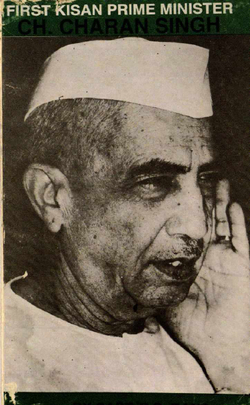R.S. Rana's "First Kisan Prime Minister" transcends a mere biography, offering a nuanced exploration of Chaudhary Charan Singh's life and legacy. Rather than a linear narrative, Rana constructs a compelling portrait of Singh, a leader whose political trajectory was inextricably linked to India's rural heartland.
The text delves into Singh's formative years, highlighting the rural influences that shaped his unwavering commitment to improving the lives of farmers. This agrarian consciousness manifested in his early political career, where Singh emerged as a powerful advocate for the peasantry. Rana meticulously analyses Singh's speeches and legislative efforts, particularly his landmark address on March 23, 1976, in the Uttar Pradesh Legislative Assembly. These pronouncements combined visionary ideals of agrarian reform with pragmatic solutions for India's nascent agricultural economy.
Rana then dissects the tumultuous period of Singh's Prime Ministership. The narrative navigates the political maelstrom of the Janata Party era, marked by internal conflicts, external pressures, and Singh's determined efforts to navigate them. As Prime Minister, Singh prioritised policies that bolstered the rural economy, aiming to bridge the gap between urban prosperity and rural precarity. His tenure, though brief, was marked by a steadfast commitment to Gandhian socialist principles and decentralised economic planning.
The book meticulously dissects the factors that led to the fall of the Janata government, weaving a tapestry of internal contradictions, strategic missteps, and the machinations of a resurgent opposition. Rana's analysis extends beyond Singh's immediate political fate, encompassing the return of Indira Gandhi, the controversies of her second term, and her tragic assassination.
Rana doesn't shy away from the complexities of the era, also exploring the rise of Rajiv Gandhi and the scandals that tarnished his administration. However, the narrative consistently returns to Singh's vision, highlighting the Janata Party's economic policy statement as a testament to his enduring commitment to a balanced approach – one that fostered economic growth without sacrificing social justice. The document serves as a call to action, urging a collective national effort towards economic development and social equity, with a specific emphasis on the need for the elite to contribute to the national good.
By positioning Singh as a pivotal figure amidst a broader canvas of Indian political and economic development, Rana elevates the narrative beyond mere biography. Singh emerges not just as the "Kisan Prime Minister," but as a leader whose principles and unwavering focus on the rural sector continue to resonate in contemporary India's socio-political discourse. The book serves as a valuable resource for those seeking a deeper understanding of this influential figure and the complex dynamics of agrarian politics in a developing India.


